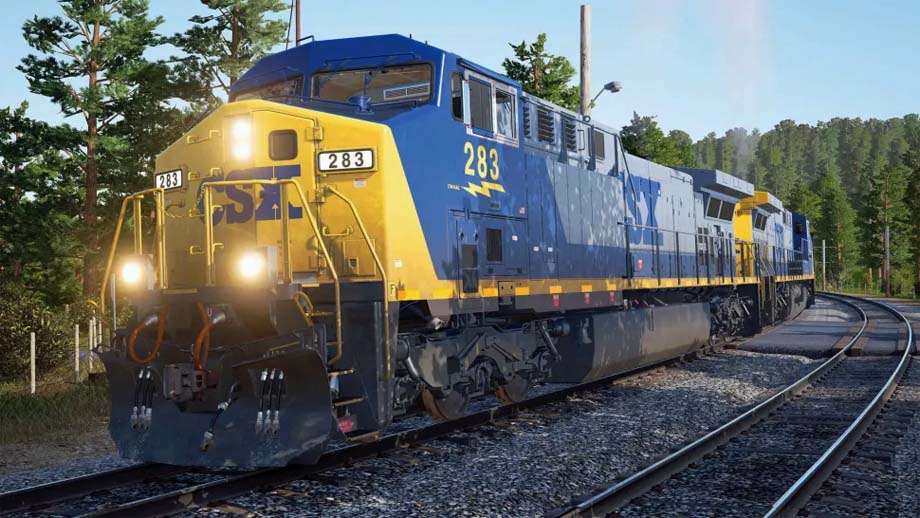
You may not know it, but train simulators are enormously successful on PC.
While you might have played one yourself out of curiosity, there are others who are wildly passionate about them.
In the same way Microsoft Flight Simulator attracts people interested in aviation, who otherwise don't play games, train simulators are enjoyed by rail enthusiasts who want to get closer to their hobby.
"It's a relaxing and calming way to spend time," says Reddit user "Canadave" in a thread discussing why people are so into the genre.
"There are some vague elements of a spatial puzzle to it. You have to plan out your actions and figure out the best way of getting everything where you need it to be," they add.
"The best part about Train Sim for me is getting to drive trains I've seen before," says "mygawd", while "tppiel" notes, "It's the same reason people play Football Manager, and Arma, you are not a manager/pilot/soldier in real life, but you are interested enough in the role."
Train Sim World, a simulator from Dovetail Games, is one of a long line of hardcore sims with a focus on realism.
PC Gamer writes about simulators more than most outlets, but rarely about the people who actually make them.
So I thought this was the perfect opportunity to talk to Dovetail about what it's like working in such an ultra-specific genre, and how you even go about translating driving a train in the real world into a simulation.
"We have around 50 developers working on Train Sim World across all disciplines. I started my career in game development as a tester for Electronic Arts. I spent roughly 15 years working with them on Bullfrog, Maxis, and EA Sports titles. Then I transitioned into development, working with SCi Games, Lego Media, and Square Enix, where I worked with Avalanche on Just Cause 3, before joining Dovetail in 2014," says Darren Potter, executive producer at Dovetail Games.
Potter says making games in a genre like this is enjoyable because he gets to work with a group of people who are incredibly passionate about the subject matter, making games for people who are equally passionate.
"I also like the challenge of breaking down something that exists in real life and then using our collective knowledge to work out how to simulate that within the hardware constraints we work to."
When it comes to determining how the game's trains feel when the player gets their hands on the controls, Dovetail uses a system called SimuGraph.
"Firstly, the feel must tally with our combined understanding of what it's really like to drive a train, from first-hand experience of feedback from those that have driven them. Then we use our vehicle dynamics engine, SimuGraph, to visualise the performance of the vehicles, so we can see that when we input the real world data into our physics systems, they behave as expected."
By combining this data with the studio's own personal expectations of what a train should feel like to drive, Dovetail gets a good sense of when one of its vehicles feels just right.
"It's also interesting to me to take something that is incredibly complex to make work in real life and create play paths, user aids, and gameplay challenges that mean anyone can use the controls and have a great, authentic experience."
Dovetail also works closely with real train companies, including the UK's Great Western Railway, which is reflected in the game's authentic stations, trains, and branding.
"We don't publish any content that isn't fully licensed. We want to ensure everything is authentic and high quality, and we work with companies like GWR from initial site visits to collect photo and video reference, through to gathering sound recordings and licence approval," says Potter.
Down the Line
Unlike games that are released, get a few updates, and disappear forever, simulators like Train Sim World are in it for the long haul.
You can probably expect a huge number of updates and expansions to be added to the game over the coming years, as well as regular improvements to the core train-driving experience.
"We're always looking to improve what we have, for instance ongoing performance and optimisations to get stuff working better. The current focus is on creating a high-quality baseline for the various content types we need to build new features on in the future," explains Potter.
This includes updates to SimuGraph, which will improve the physics of diesel-electric trains, among other things.
That might not mean much to the typical gamer out there, but someone else will be counting the days.
I ask Potter what the train sim player base is like from a developer's perspective.
"Our community, like many of the dev team, are train enthusiasts. They are very discerning and hard to please, but no more so than ourselves, so we appreciate their passion and feedback. It's what drives us. We have a very wide range of ages interested in the game. The passion for trains transcends demographics."
If you want to take the simulation to the next level, there are companies who build specific peripherals that recreate the main controls of a train.
A popular one, the Rail Driver, promises that it'll make you feel like you're driving a train, not a computer.
It's this kind of variety, catering for the most beautifully specific of tastes, that makes PC the best platform for games.
And I'm glad there are people out there virtually living their dreams of becoming a train driver.
Andy Kelly.
(likely no image with original article)
(usually because it's been seen before)
provisions in Section 29 of the
Canadian Copyright Modernization Act.

